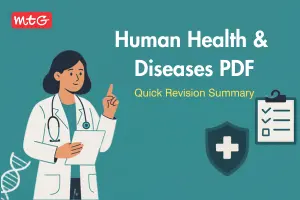Microbes in Human Welfare Class 12 Biology MCQ with Answers has been organized according to the latest exam pattern in the CBSE Class 12 Biology syllabus for the upcoming CBSE Class 12 Biology Exam. Microbes in Human Welfare covers topics like microbes in household and industrial products, microbes in sewage treatment and production of biogas, microbes as biocontrol agents and biofertilisers, These questions are designed to help students understand the concept thoroughly. They are helpful for revision and for grasping the concepts effectively. These MCQ questions cover in-text book questions and important topics to help students assess their preparation level for CBSE board exams.
Recent – Human Health and Diseases Class 12 Biology MCQ With Solutions
CBSE Class 12 Chapter 8 Microbes in Human Welfare MCQs
Check below the CBSE Class 12 Biology MCQ with answers and Clear your idea of Chapter 8 Microbes in Human Welfare.
Q.1. Which of the following is put into anaerobic sludge digester for further sewage treatment?
(a) Primary sludge
(b) Floating debris
(c) Effluents of primary treatment
(d) Activated sludge
Answer
Check Out – 11 Most Important Graphics of NCERT Class 12th Biology That You Cannot Miss
Q.2. Select the incorrect statement regarding chemical fertilisers.
(a) They are easily soluble in water and are quickly absorbed by the plants.
(b) They can be applied to standing crops and are required in small quantities as compared to manures.
(c) They adversely affect the useful microbes present in the soil.
(d) They improve physical properties of soil such as aeration, water holding capacity and humus content.
Answer
Practice More – CBSE Sample Paper Class 12 for 2023-24 Boards | FREE PDF from MTG
Q.3. The enzymes used to dissolve blood clots in case of heart attack is
(a) PNA (b) TPA
(c) NAD (d) REP
Answer
(b): TPA (Tissue plasminogen activator) or streptokinase is obtained from the cultures of some hemolytic bacteria Streptococcus. It has fibrinolytic effect, therefore, it helps in clearing blood clots.
Q.4. Which of the following can be used as a biocontrol agent in the treatment of plant disease?
(a) Lactobacillus (b) Trichoderma
(c) Chlorella (d) Anabaena
Answer
Q.5. Select the correct statement regarding biocontrol agents.
(a) Ladybird beetles and dragonflies are used to get rid of aphids and mosquitoes.
(b) Bacillus thuringiensis bacteria are used to control butterfly caterpillars.
(c) Trichoderma sp. are used to control several plant pathogens.
(d) All of these
Answer
Q.6. Study the given table and identify A, B and C.
| A | Aspergillus | Clearing beer and whisky |
| Lipases | Candida | B |
| Amylases | C | Softening of bread |
| A | B | C | |
| (a) | Lactases | Removing oily stains | Bacillus |
| (b) | Proteases | Flavouring cheese | Rhizopus |
| (c) | Proteases | Coagulation of milk protein | Streptococcus |
| (d) | Pectinases | Preparation of green coffee | Aspergillus |
Answer
Q.7. Which of the following statements are true (T) or false (F) ?
(i) Antibiotics are effective against all pathogens.
(ii) Broad spectrum antibiotic destroys a number of pathogens that belong to different groups.
(iii) Penicillin was the first antibiotic discovered by Alexander Fleming (1928).
| (i) | (ii) | (iii) | |
| (a) | T | F | T |
| (b) | T | T | F |
| (c) | F | T | F |
| (d) | F | T | T |
Answer
Q.8. Which of the following statements is incorrect?
(a) Primary sludge does not have flocs of decomposer microbes.
(b) Biogas generation involves aerobic digestion of organic wastes.
(c) Bioherbicides are used for inhibiting the growth of weeds.
(d) Second stage of biogas formation is the formation of organic acids from monomers.
Answer
Q.9. Which of the following organic acids is obtained from yeast Candida lipolytica and is used in flavouring and preservation of food and candies.
(a) Acetic acid (b) Citric acid
(c) Gluconic acid (d) Butyric acid
Answer
Q.10. Choose the correct pairs from the following.
(i) Bacillus thuringiensis – Cry protein
(ii) Mycorrhiza — Leguminous plants
(iii) Statins – Inhibit cholestrol synthesis
(iv) Trichoderma polysporum – Cyclosporin A
(a) (i), (ii) and (iii)
(b) (i), (ii), and (iv)
(c) (i), (iii) and (iv)
(d) (ii), (iii) and (iv)
Answer
We hope the MCQs for the CBSE Class 12 Biology Chapter 8 on Microbes in Human Welfare are helpful for your board exam preparation.
Keep learning and stay updated with us for more CBSE exam updates.






























